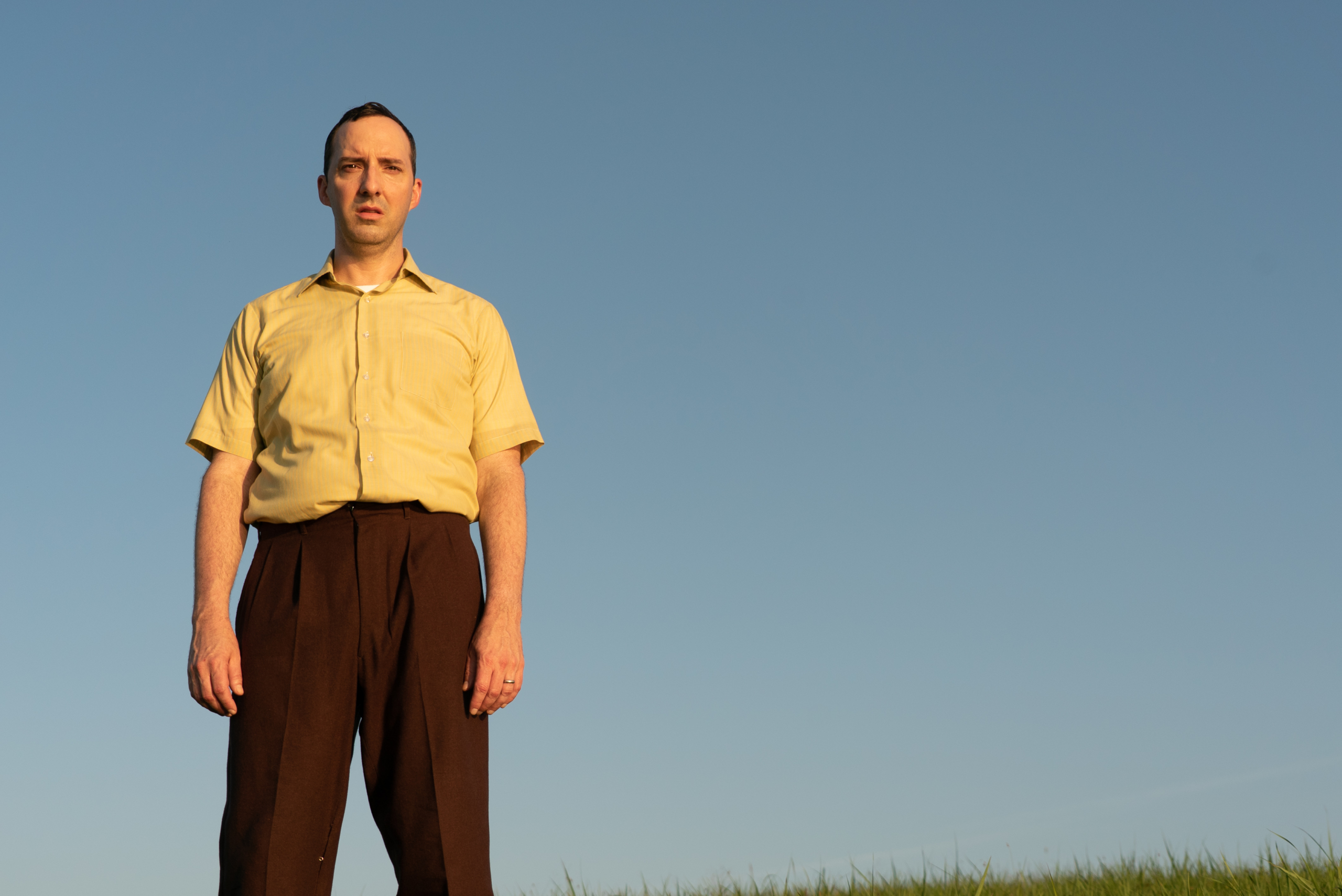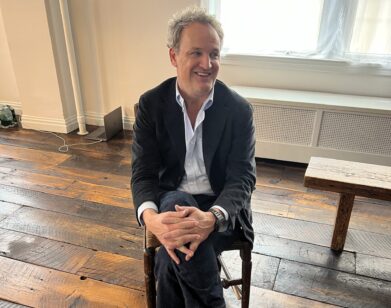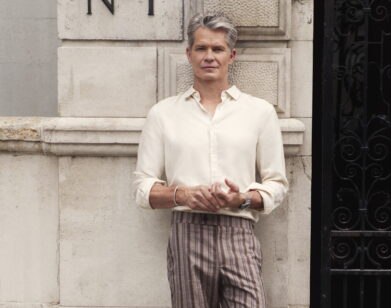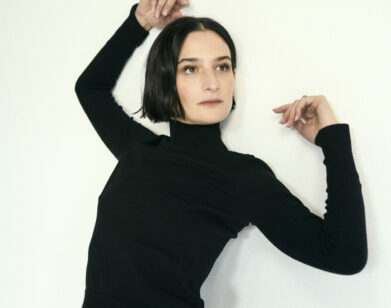Tony Hale Is King of the Mama’s Boys

Photo courtesy Samuel Goldwyn Films.
Tony Hale, Hollywood’s resident good boy, is venturing into new territory. You may know the Alabama-born actor for his comedic triumphs as Buster, Orange County’s iconic mama’s boy, in Arrested Development; Gary, D.C.’s bitchiest mime, opposite Julia Louis-Dreyfus in Veep; or perhaps, as the existentially conflicted Forky in Toy Story 4. The remarkable continuity among these characters is difficult to ignore—their bone-deep neuroses, their sexual ambiguity, and their cringe-worthy desperation are all part and parcel of their enduring comedic appeal—but Hale has also started flexing more dramatic muscles.
Since the final season of Veep, Hale has channeled his talents into art house terrain as a ‘60s suburban homophobe who overcomes his prejudices in To The Stars, available on Amazon this week. Later this year, he will play Benedict in Hulu’s TV adaptation of the acclaimed children’s book series Mysterious Benedict Society. In these new ventures, Hale’s humor hovers just beneath the surface, manifesting in the occasional dry quip or in the shadow of a Gary-patented smirk. No matter how far Hale strays from his beloved basket cases, he’ll never truly abandon them.
Talking to Hale about Buster or Gary, his companions for a cumulative 12 years, is like talking to a mother about her hapless offspring. Hale could discuss their motivations and setbacks endlessly; his empathy for their struggles is palpable. Buster is a perpetually quivering bundle of nerves wrapped up in a love-hate relationship with his gloriously frigid mother Lucille. Gary, the silent sidekick to erstwhile president Selina Meyer, is a cultish devotee who prostrates himself at her stilettoed feet. To learn more about the man behind the man-child, and to hear what it’s like to make the iconic Julia Louis-Dreyfus laugh, we sat down with Hale to discuss everything from managing anxiety to late nights spent binging Veep blooper reels on the couch.
———
MARA VEITCH: Buster and Gary have a lot in common. What are some of the things that you, Tony Hale, have in common with them?
TONY HALE: I think in any character you do, you kind of have to find a part of them in yourself in order to play it the best you can. My greatest shared trait with Buster and Gary is definitely that I’ve struggled with anxiety all my life. Buster and Gary both kind of … define anxiety. So, I definitely tapped into that reservoir within myself. It was fun to take it to the extreme, especially with Buster.
VEITCH: I can imagine.
HALE: Because he’s just—I mean, bless his heart—he can barely function.
VEITCH: He’s a basket case. Often, we’re taught to manage anxiety by learning how to diffuse it. But these two characters both embrace the total escalation of these sorts of feelings. Is there a satisfaction in getting to do what you never can in real life and just wind yourself up? Does it feel kind of good to let that energy take on whatever extreme form it pleases, or does that scare you?
HALE: That’s actually a great question. One thing that was fun, especially with Buster, was wearing anxiety on the surface like that. Typically in life, anxiety is so internal—it’s just a constant tension in your mind. I’m always creating these false narratives and living in these narratives that haven’t happened. Buster, though—his anxiety just lived all over his body and he would just convulse under it and fall apart and scream.
VEITCH: It’s very physical for him.
HALE: Exactly. His head would jerk back, his arms would go back like he’d been attacked.
VEITCH: You must need to override every muscle you develop to cope with anxiety in real life to play that character.
HALE: Oh, totally.
VEITCH: Buster and Gary are also both shameless mama’s boys. Do you consider yourself a mama’s boy?
HALE: [Laughs] Definitely. I mean, I’m close to my parents, but I’m not dysfunctional in the same way. And I don’t know if Buster loved Lucille as much as Gary worshiped Selina. There’s a lot of hate between Buster and Lucille. Whereas Gary was just completely delusional—he never heard or saw anything negative about Selina. He had rose-colored glasses and ear muffs on all the time.
VEITCH: Do you feel pigeon-holed into playing these kinds of characters?
HALE: I absolutely love, love, love, love playing these characters, but I’m really excited about my next gig. I’m playing Benedict in The Mysterious Benedict Society on Hulu. It’s an adaptation of a beautiful children’s book series that teaches empathy in response to all these negative messages in the world. I do want to return to this character type though, I think the Busters and Garys of the world have a lot to teach us as well.
VEITCH: Gary and Selina have such a tight connection in Veep, and clearly so do you and Julia Louis-Dreyfus. Are there certain things that you do that you know will always get a laugh from her?
HALE: I think probably what made us laugh the hardest was just watching each other sit in tension, knowing that the other person was about to break during a scene. It felt like a game of chicken, where we were just like, “You’re going to break.”
VEITCH: Are there any particular moments of chicken that you remember while filming Veep?
HALE: Actually, I’ve only watched each episode of the show maybe once. But I’ve seen those gag reals hundreds of times, because that’s the joy I remember. Us trying to keep a straight face and just dissolving. Selina never let Gary speak, so I would just stand behind Julia and make these odd, guttural noises and facial expressions like a bitchy mime. It was definitely tough for us to keep it together when we heard some of Gary’s reactions.
VEITCH: Are you saying that you, with great frequency, watch these gag reels?
HALE: Oh gosh, yeah. Just like, 4 AM on the couch. It’s immediate joy for me, because what I miss the most from the Veep years is the hanging out and laughing and sharing … spending life together, really. I guess most of my memories happened off-camera. I love them all.
VEITCH: It’s clear during larger ensemble scenes that there was a lot of improvisation happening. Can you speak to that?
HALE: The uniqueness of Veep was that we actually had rehearsal time, and typically in television and film you don’t. You do in theater obviously, but in TV and film, you just show up that day knowing your lines, you shoot it and go home. You’re not given much time to play with the material. And on Veep, we really had the time to see if stuff gelled. When Julia and I got a scene, we’d arrive onset and try to figure out how to bump the comedy with physicality. When will she drop her coat, and when am I going to catch it? When is Selina going to scream at Gary for fumbling something? It was like this chaotic choreography.
VEITCH: Do you think that Selina resembles our current president in any way?
HALE: I think they both think about themselves almost constantly. Selina also posted a single tweet once that didn’t pass through the chain of command, and the entire administration panics. But with this guy, it’s like Lord of the Flies out there with Twitter.
VEITCH: That’s for sure.
HALE: It is disturbing how some of Veep’s crazier storylines align with our actual reality now, so that’s a little freaky. Often when I’m watching the news, I want to laugh because everything is so crazy. But I feel guilty about laughing. I will say, spending that much time in D.C. and getting acquainted with that world, I’m comforted by the fact that there are people in D.C. behind the scenes who really are there for the right reasons and are working very hard.
VEITCH: At one point, Gary’s shoulder is nearly destroyed by the weight of the bag he carries for Selina. What was actually in there?
HALE: Tony’s bag and Gary’s bag were quite different. Mine was just empty water bottles, granola bar wrappers, and script pages. Gary would not like that, I’m telling you that. I imagined him going home every night and memorizing the contents of each pocket. That, and worshiping some kind of idol of Selina in his dining room.






